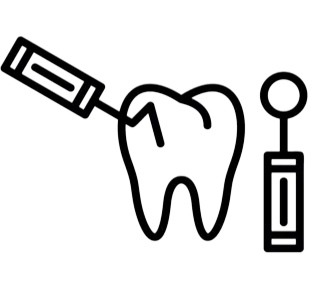If you’ve recently undergone endodontic treatment, also known as a root canal, you might be wondering about the next steps in your dental journey. After tackling infection and saving your tooth, there’s often one more crucial phase: getting a dental crown. But why are these crowns so important? They play a pivotal role in restoring both function and aesthetics to your smile after such an intensive procedure. In this post, we’ll explore what endodontics entails, the purpose of dental crowns post-treatment, and how they contribute to long-term oral health, especially if you're seeking
quality care right here in Winston-Salem NC. Dive in to discover how these crowns can help safeguard your smile for years to come!
What is Endodontic Treatment in Winston-Salem NC?
Endodontic treatment, commonly known as a root canal, focuses on the inner workings of your teeth. It's designed to treat issues affecting the pulp—an essential tissue that houses nerves and blood vessels.
When decay or injury exposes this delicate area, it can lead to severe pain and infection. Endodontics aims to save the tooth by removing damaged pulp and disinfecting the chamber.
The process typically involves numbing the area to ensure comfort. Once you're relaxed, a dentist will create an opening in your tooth’s crown for access. They’ll carefully clean out any infected material before sealing it with a biocompatible substance.
This procedure not only alleviates discomfort but also preserves your natural tooth structure whenever possible. After healing from endodontic treatment, additional restorations like dental crowns are often recommended to reinforce and protect your revitalized smile.
The Purpose of Dental Crowns After Endodontic Treatment
After undergoing endodontic treatment, also known as root canal therapy, the integrity of your tooth can be compromised. This is where dental crowns come into play.
The primary purpose of a dental crown is to restore strength and functionality to the treated tooth. Once infection or decay has been addressed, a crown helps protect what remains. It acts like a cap that covers the entire visible portion of the tooth.
Additionally, crowns enhance aesthetics. They can mimic the natural appearance of teeth, ensuring your smile looks vibrant and healthy after treatment.
By reinforcing the structure of your tooth, crowns help prevent future fractures or damage. This added layer creates peace of mind for patients who want to maintain their oral health long-term in Winston-Salem, NC.
Contact us to learn more.
Types of Dental Crowns Used After Endodontic Treatment
When it comes to dental crowns post-endodontic treatment, several options are available. Each type has its own unique advantages.
- Porcelain crowns are popular for their natural appearance. They blend seamlessly with your existing teeth, making them ideal for front-of-the-mouth restorations.
- Metal crowns offer exceptional strength and durability. They're often recommended for molars where chewing pressure is highest. Their long lifespan makes them a practical choice.
- Resin-based crowns are another alternative. While they may not be as durable as metal or porcelain, they're less expensive and can provide a good aesthetic solution in certain cases.
- Ceramic crowns combine the best of both worlds—strength and appearance. They’re great for patients looking for something that mimics natural tooth enamel closely while still offering solid performance.
Choosing the right crown depends on various factors like location in the mouth, bite force, and personal preference.
The Process of Getting a Dental Crown after Endodontic Treatment
Getting a dental crown after endodontic treatment is a straightforward process. It typically begins with an initial consultation where your dentist assesses the tooth in question.
During this visit, they will take X-rays to evaluate the extent of damage and ensure that the tooth can support a crown. Once that's confirmed, you’ll often receive local anesthesia to numb the area around your tooth.
The next step involves shaping the tooth for proper fitment of the crown. This might mean removing some portion of the enamel to create enough space for it. Afterward, impressions or digital scans are taken to craft a custom crown that matches your bite and appearance.
While waiting for your permanent crown, you may be fitted with a temporary one. This keeps everything protected until your final appointment, when you'll have your new dental crown cemented securely in place.
Benefits of Dental Crowns After Endodontic Treatment
- Dental crowns provide crucial support after endodontic treatment. They reinforce the tooth structure, which can weaken due to decay or infection. This added strength helps prevent fractures and extends the life of your treated tooth.
- Aesthetic appeal is another significant benefit. Crowns can be customized to match the color and shape of your natural teeth, ensuring a seamless look. No one will know you've had dental work done.
- Additionally, crowns protect against future damage. Since they cover the entire tooth surface, they act as a barrier against bacteria that could lead to reinfection.
- Comfort is also improved with dental crowns in place. They restore functionality for chewing and speaking, allowing you to enjoy your favorite foods without worry.
Investing in a crown means investing in oral health and confidence for years to come.
Maintaining Dental Crowns for Long-Term Success
Maintaining dental crowns requires a bit of diligence, but it’s worth the effort.
- Start with good oral hygiene. Brush your teeth twice daily and floss regularly to keep the area around your crown clean.
- Regular dental check-ups are crucial too. Your dentist can monitor the health of your crown and surrounding teeth. They’ll also catch any potential issues early on.
- Be mindful of what you eat. Hard foods or sticky candies can damage crowns, especially if they’re made from porcelain or resin. Opt for softer foods when possible.
- Don’t forget about habits that might affect your crowns negatively, like grinding your teeth at night. If this is an issue, consider discussing protective solutions with your dentist.
- Stay informed about any changes in sensation or appearance related to your crown; these could signal underlying problems needing attention.
Conclusion
Dental crowns play a vital role after endodontic treatment. They provide the necessary support and protection to a tooth that has undergone such an intensive process. Understanding their importance can help you make informed decisions about your dental health.
Endodontics in Winston-Salem, NC, focuses on preserving natural teeth through procedures like root canals followed by crown placement. This combination not only saves teeth but enhances your smile's functionality and appearance.
Choosing the right type of crown and maintaining it properly ensures longevity and effectiveness. Regular check-ups with your dentist will keep both your dental work and overall oral health in top shape.
If you've recently had endodontic treatment or are considering it, remember that crowns are often essential for long-term success. Take proactive steps towards good dental care, so you can enjoy a healthy smile for years to come.
To find out more about the dental services we offer at Eric J. Sadler, DDS & Associates, Winston-Salem, NC, call (336) 744-1300 or schedule an online consultation. You can also visit Dentist in Winston-Salem NC at 3801 Indiana Avenue, Winston-Salem, NC 27105.









